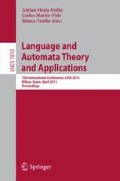Abstract
The channel capacity of a deterministic system with confidential data is an upper bound on the amount of bits of data an attacker can learn from the system. We encode all possible attacks to a system using a probabilistic specification, an Interval Markov Chain. Then the channel capacity computation reduces to finding a model of a specification with highest entropy.
Entropy maximization for probabilistic process specifications has not been studied before, even though it is well known in Bayesian inference for discrete distributions. We give a characterization of global entropy of a process as a reward function, a polynomial algorithm to verify the existence of an system maximizing entropy among those respecting a specification, a procedure for the maximization of reward functions over Interval Markov Chains and its application to synthesize an implementation maximizing entropy.
We show how to use Interval Markov Chains to model abstractions of deterministic systems with confidential data, and use the above results to compute their channel capacity. These results are a foundation for ongoing work on computing channel capacity for abstractions of programs derived from code.
The research presented in this paper has been partially supported by MT-LAB, a VKR Centre of Excellence for the Modelling of Information Technology.
Access this chapter
Tax calculation will be finalised at checkout
Purchases are for personal use only
Preview
Unable to display preview. Download preview PDF.
References
de Alfaro, L.: Formal Verification of Probabilistic Systems. Ph.D. thesis, Stanford (1997)
Bhargava, M., Palamidessi, C.: Probabilistic Anonymity. In: Abadi, M., de Alfaro, L. (eds.) CONCUR 2005. LNCS, vol. 3653, pp. 171–185. Springer, Heidelberg (2005)
Biondi, F., Legay, A., Malacaria, P., Wąsowski, A.: Quantifying Information Leakage of Randomized Protocols. In: Giacobazzi, R., Berdine, J., Mastroeni, I. (eds.) VMCAI 2013. LNCS, vol. 7737, pp. 68–87. Springer, Heidelberg (2013), http://dx.doi.org/10.1007/978-3-642-35873-9_7
Chatterjee, K., Sen, K., Henzinger, T.A.: Model-Checking ω-Regular Properties of Interval Markov Chains. In: Amadio, R.M. (ed.) FOSSACS 2008. LNCS, vol. 4962, pp. 302–317. Springer, Heidelberg (2008)
Chatzikokolakis, K., Palamidessi, C., Panangaden, P.: Anonymity Protocols as Noisy Channels. In: Montanari, U., Sannella, D., Bruni, R. (eds.) TGC 2006. LNCS, vol. 4661, pp. 281–300. Springer, Heidelberg (2007)
Chen, H., Malacaria, P.: Quantifying maximal loss of anonymity in protocols. In: Li, W., Susilo, W., Tupakula, U.K., Safavi-Naini, R. (eds.) ASIACCS. ACM (2009)
Clark, D., Hunt, S., Malacaria, P.: A static analysis for quantifying information flow in a simple imperative language. Journal of Computer Security 15 (2007)
Cover, T., Thomas, J.: Elements of information theory. Wiley, New York (1991)
Girardin, V.: Entropy maximization for markov and semi-markov processes. Methodology and Computing in Applied Probability 6, 109–127 (2004)
Jaynes, E.T.: Information Theory and Statistical Mechanics. Physical Review Online Archive (Prola) 106(4), 620–630 (1957)
Jonsson, B., Larsen, K.G.: Specification and refinement of probabilistic processes. In: LICS, pp. 266–277. IEEE Computer Society (1991)
Kozine, I., Utkin, L.V.: Interval-valued finite markov chains. Reliable Computing 8(2), 97–113 (2002)
Malacaria, P.: Algebraic foundations for information theoretical, probabilistic and guessability measures of information flow. CoRR abs/1101.3453 (2011)
Malacaria, P., Chen, H.: Lagrange multipliers and maximum information leakage in different observational models. In: PLAS 2008, pp. 135–146. ACM, New York (2008)
Millen, J.K.: Covert channel capacity. In: IEEE Symposium on Security and Privacy, pp. 60–66 (1987)
Puterman, M.L.: Markov Decision Processes: Discrete Stochastic Dynamic Programming. Wiley-Interscience (April 1994)
Shannon, C.E.: A mathematical theory of communication. The Bell System Technical Journal 27, 379–423 (1948)
Stoer, J., Bulirsch, R., Bartels, R., Gautschi, W., Witzgall, C.: Introduction to Numerical Analysis. Texts in Applied Mathematics. Springer (2010)
Author information
Authors and Affiliations
Editor information
Editors and Affiliations
Rights and permissions
Copyright information
© 2013 Springer-Verlag Berlin Heidelberg
About this paper
Cite this paper
Biondi, F., Legay, A., Nielsen, B.F., Wąsowski, A. (2013). Maximizing Entropy over Markov Processes. In: Dediu, AH., Martín-Vide, C., Truthe, B. (eds) Language and Automata Theory and Applications. LATA 2013. Lecture Notes in Computer Science, vol 7810. Springer, Berlin, Heidelberg. https://doi.org/10.1007/978-3-642-37064-9_13
Download citation
DOI: https://doi.org/10.1007/978-3-642-37064-9_13
Publisher Name: Springer, Berlin, Heidelberg
Print ISBN: 978-3-642-37063-2
Online ISBN: 978-3-642-37064-9
eBook Packages: Computer ScienceComputer Science (R0)

